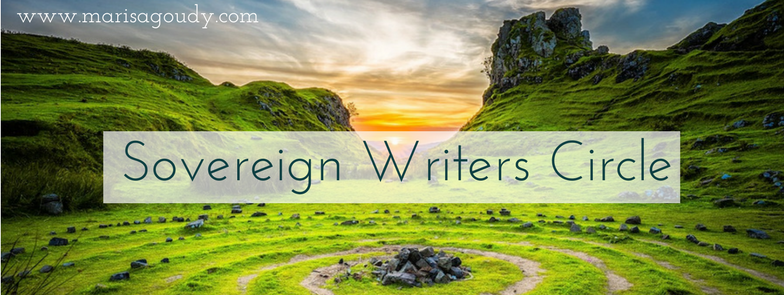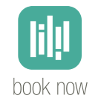
BLOG
What Story Is Mine to Tell Right Now?
Whenever I find myself spinning and I have the urge to write, I ask myself:
What story is mine to tell right now?
This is the essential question, whether my mind happens to be spinning with anxiety or with inspiration.
Whenever I find myself spinning in circles and I have the urge to write, I ask myself:
What story is mine to tell right now?
This is the essential question, whether my mind happens to be looping with anxiety or leaping with inspiration.
(Have you noticed how they both tend to buzz at the same frequency? The nerves of worry and the nerviness of creativity are easily confused. When I ask this question, there’s a better chance of moving toward healing and productive cross pollination. That’s when the words finally start to flow.)
So Much To Say, So Hard to Find the Words
From my experience, “what story is mine to tell right now?” is the only place to begin when you feel the pressure to put words on the page and feel wordless at the very same time.
Here’s something we tend to forget when we’re overwhelmed and there is so much to say, either because the brain is swirling too fast with worry or soaring with new ideas: we writers can only set down one word at a time.
“One word at a time” is the blessed miracle and the maddening flaw of language.
We are forced to condense the immense and the ineffable into clusters of letters, limiting it all down to discrete, interconnected units of ideas. With time and focus, we spool a narrative. We can throw ourselves wide open to the expanse of sentences, stanzas, and stories.
Here’s what might happen when you dare to ask, “what story is mine to tell right now?”
When I ask myself this question, I am almost always surprised.
Sometimes, I need my journal and quiet hour. I must fill the page with rhetorical questions, nonsense sentences, and magnificent, revelatory errors of all kinds.
(When I wrote into this prompt yesterday, I definitely scrawled “when I know when I must right…” Cringe! But look what was revealed in that misspelling! Oh, my obsession with being correct, even on the uncensored pages of my own little green book)
Sometimes, the words take me to fairy glens and eighteenth century drawing rooms.
(Ok, so the novel got stalled in the transition between the endless 18-month summer and the uncertain fall, but there’s a book brewing, and it’s the story I was born to tell. When I give myself the freedom to describe a sacred well made of starlight and sphagnum moss or invent a whispered conversation between the countess and the peddler down the lane, I trust that I am making magic. You transform the very fabric of the world when you conjure and describe you own visions, stitch by stitch and word by word.)
Sometimes, the words come out seeking their place in the marketplace, issuing invitations to come play.
(I’ll be the first to say that the “real writer” in me rolls her eyes at this naked display of capitalism, but then I remember that we live in a both/and universe. As the Irish poet Rita Ann Higgins says, “poetry doesn’t pay,” but the mortgage still comes due. And so, I ask my words, as they emerge one letter at time, to call in the writers, the healers, the dreamers, and the sovereignty seekers who will hear my song and use these ideas to add to their own. So, next time you see my images on Instagram, do read the captions, too. They’re lovingly crafted by a writer trusting the story that wants to be told.)
Sometimes the story is a text to a friend. Sometimes it’s an email to my grandpa. Sometimes it’s a note I stick in the lunch box in case second grade feels hard today.
And sometimes the story that is mine to tell must be silently pounded into the pavement or held by the trunk of a beloved tree. Sometimes the story that is yours to tell is not yet speech ripe and will not come no matter how fine the pen, how quiet the room, how inspirational the view.
Trust the story. Trust the moment. Trust yourself.
The words will come in their own time, as they always do: one at a time, in a jumble or a flow. They will carry you onward to the story you must tell.
“What story is mine to tell right now?” is just one of many questions I pose to the dreamers, healers, and seekers who long to build a writing practice and birth their stories into the world.
In the Sovereign Writers’ Knot, the newest incarnation of my online writing community, you can find the the space, time, and company that will help you bring your words into the world.
We are welcoming new members through September 29. Learn more and apply now.
On Book Writing, Tarot Reading, and the Stories We Tell Ourselves
Even the writing coach gets writer’s block. When I cannot decide what needs my attention, either on I always go to my tarot cards.
Ten years ago, I gave birth to a daughter. Now, on another gold-blue October day a decade later, I am in the midst of another long labor. This time, I am birthing a book.
The book isn’t here yet - the release date for The Sovereignty Knot: A Woman’s Way to Freedom, Power, Love, and Magic is set for February, 2020 - but today is the day I must say, “It’s done.” I’m going over the proofreader’s changes and, in just a few hours, I will declare an end to years of writing, rewriting, editing, and polishing. No more additions or subtractions. These two hundred pages of prose must tell the entire story. (Until the next book!)
I feel both empty and full. All emptied by exhaustion and filled by hope. Such a combination of love and depletion has a way of making you feel so heavy and so flimsy at the same time - especially when you realize you have so much more to give.
There is still much to do (both as a mom and writer!), but now that the latest big project is complete, I am left to wonder: where my mind is meant to wander?
This is my moment to breathe before I dive into the book promotion and marketing, which will be its own tremendous emotional and creative undertaking. This is also my moment to contemplate motherhood before I need to prep the gifts, the cupcakes, and the candles.
And so, I give myself permission to do exactly what I invite my Sovereign Writers to do when I see myself at a creative and emotional crossroads.
I sit down to write.
The Writing Coach Gets Writer’s Block, Too
But where do I begin now that the project that has occupied my attention for so long is finally finished? What requires or deserves my attention?
Should I try to recapture the emotions of the day I birthed my first growing girl? Is it important to review the decade that stretches back to that stunning moment of her arrival? Should I fill a page with tales of my daughter’s power and potential, weaving prayers that her courage will blaze more brightly than her fear and that her sense of Sovereignty with outmatch the bastards who will inevitably try to get her down?
Or, can I just watch the falling leaves litter the page and savor the sweetness as a ladybug alights on my moving pen? Can I just let the day mother me as I trust that my creations, both human and literary, can make their way through this day without my worry nor intervention?
Can I just be in this moment, tired and proud, overflowing with gratitude and apprehension? Can I put aside my worries for just a little while and meet myself on the page during this perfect October afternoon?
The Medicine I Take When the Words Won’t Flow
And this is when I realize that, even though I know writing is the best medicine, sometimes it requires a big old spoonful of sugar first.
You need to get centered and refocus your inner vision before you can just dive in and meet yourself on a blank page.
When this happens to me, I do something that I’ve been doing since long before I became a mother or an author… I look to the cards.
This might be my first child’s tenth birthday, but it’s almost my tarot deck’s twentieth. In 1999, I was an American college student living in Galway, Ireland. On Samhain - that’s probably “Halloween” to you - I bought Caitlin Matthew’s Celtic Wisdom Tarot at the Hawkins House Bookshop. I’ve called on these cards for guidance and assurance ever since.
I never cease to be surprised and gratified by the messages that come through when I take the time to consult the cards. (And I never stop saying, “You can’t make this shit up!”) As I saw the cards arrayed before me on this particular autumn afternoon, part of me sighed “of course” and part of me gasped “thank you.”
The cards that come up for my daughter and my book offered layers of blessings and hope. The card that represents me showed me how much I am struggling to accept all the goodness and all the possibility being lavished upon us right now.
Inside My “What Needs My Attention Now?” Tarot Reading
I came to the cards knowing that I both my daughter’s milestone birthday and the birthing of my book were competing for my attention. I also knew that I was confused about how to hold myself in the midst of all this creative magic.
Though I didn’t know what to write about in my journal, I knew just what to do with the cards. Intuitively, I laid two cards for my daughter, and two cards for my book. I placed one card for myself at the center.
Of course, the first card to represent my daughter is a 10. The 10 of Art (the suit of Cups in a more traditional deck) is a sign of joy, harmony with the earth, and lasting happiness. The other card is the 1 of Knowledge (the Ace of Pentacles), which indicates Sovereignty and “the touchstone of self-realization.” It’s a perfect way to describe her own next decade, the one in which she will begin to make her own choices and learn how to work with the princess within so she can crown herself queen of her own life.
As for my book, the first card is The Fool. In the Celtic Wisdom deck, it’s called The Soul. The wide-open wanderer is just starting out on the great quest. This card is followed by the 1 of Skill (or the Ace of Wands) and is another potent symbol of beginnings, enterprise, and creative initiatives. I know I am meant to understand that the publication of this book is just the start of the adventure.
Finally, there is the card that represents me at the center of my two most vivid concerns, motherhood and authorship.
The 6 of Art (again, that’s the suit of Cups) is the only card that is out of sync with all these 10s, 1s, and 0s. It depicts a student poet in one of Ireland’s ancient bardic academies lying with eyes closed in “the house of memory.” This is where the storytellers would go to compose poetry and commit to memory the great sagas that preserved and connected the culture.
I smile because I am a storyteller and I love this card. It is the only card in the spread that is reversed, however. When a card is upside down, I understand that to mean that its energy is available to me, but it’s blocked or impeded in some way. I want to be the bard, but I’ve been so caught up in wanting it that I couldn’t see that I already am.
Finding a Way to the Page
Seeing my own story re-told before me through a series of symbols and myths loosened my grip on “can I? and “should I?” and released me from all that self-imposed stress. I was able to soak up the sunlight and simply be with the big moments that are ten years of motherhood and the birthing of a book.
Thanks to the cards, I was able to get to the page to tell this story, a story that matters to me as a mom and an author who wants to recall this important moment of becoming. I was able to perform what I call the Alchemy of Story and take my own wonder, worry, and experience and use it to tell a story that just might help a reader like you.
There are so many ways to access the stories within you. I have a feeling that the cards can help you as they’ve helped me.
Whether you’re a writer hoping to get clarity on your next creative project of your simply someone who finds herself asking “what needs my attention now?” I would love to share the cards with you.
Learn more about how a Tarot and Intuitive Healing Session can help you live and tell a more powerful story. (Book a session by October 31 and save $50!)
What to Say to the Forces and Fears that Keep You From Writing
Your mission as an agent of transformation and a force for good is to share your ideas, your experiences, and your dreams with the readers who need your message, but so much gets in the way of your words and your writing practice...
To every secret shame that silences you, say: “Thank you. I see you.”
To every overscheduled day that squeezes out your writing time, say: “Thank you. I see you.”
To every messy relationship that is too in-the-middle to describe, say: “Thank you. I see you.”
To every stomachache and sniffle and trip to the ER with the kids, say: “Thank you. I see you.”
To every fear that it has all been done before, say: “Thank you. I see you.”
To every Netflix drama whose plot line supersedes yours, say: “Thank you. I see you.”
To every shred of doubt that these words aren’t worth the effort, say: “Thank you. I see you.”
To every story that you’re living too fiercely and fully to pin to the page, say: “Thank you. I see you.”
To every whisper that you’re not clever enough or unique enough or creative enough, say: “Thank you. I see you.”
Our writing gets lost in the forest of shoulds.
Our writing gets drowned in the river of comparison.
Our writing gets scorched in the desert of distraction.
Our writing gets blown away by the winds of everyone else’s agenda.
You are responsible - deliriously, deliciously responsible - for your own stories and your own writing practice.
Your mission as an agent of transformation and a force for good is to share your ideas, your experiences, and your dreams with the readers who need your message. You need to reach out with your stories and welcome those potential clients who yearn for the wisdom and support only you can provide.
It’s time to (re)claim your right to tell and explore your stories
Now is the time stand sovereign at the center of your own stories. All the shameful and the messy ones. All the half-formed and the crazy ones. All the commonplace and mystical ones.
Now is the time to stand up for the time and energy it takes to dream and draft and craft those stories into insights that help someone else.
Now. Now is time to claim the time it takes to do all this righteous writerly reclaiming.
And, it’s time to make the space for the words that want to come through you
Tell every excuse, valid or otherwise, that you understand it has its place, but it exists on the other side of the door to your sacred writing space.
Wait, do you have a your sacred writing space?
It may be a room. It may only be a journal and a pen and an intention to find a chair where you can rest and think without interruption.
Your sacred writing space is a space in time as much as it is a place you can pin on a map. It’s the space when your heart spills open and your mind reorders chaos and your brilliance bashes up against your most foolish beliefs.
In order to find yourself in that space, in order to create that space for yourself, you must first unburden yourself.
Say: “Thank you. I see you,” to every item on the litany of resistance that pulls you away from that sacred appointment with your creativity. Ask all of those shoulds, comparison games, distractions, and demands to sit aside while you do the work that you must do.
This is how you create sacred writing space
Try it. Make your own list of the forces that pull the pen from your hand and slam the laptop on your fingers the moment you try to write into your truth. Can you say “Thank you. I see you” to those forces and politely ask them to wait until you’re done drafting into a piece of writing that matters to you?
You may need to do this exercise again and again. And you might find you need support to keep bravely staring down the hobgoblins of writer’s block…
That’s why I've created the Sovereign Writers Circle.
Learn more about the online writing group for healers, therapists, and transformation professionals. This is how you're doing develop the writing practice that supports you, your creativity, and the brilliant work you’re here to do.
The secret behind your post-election writer's block
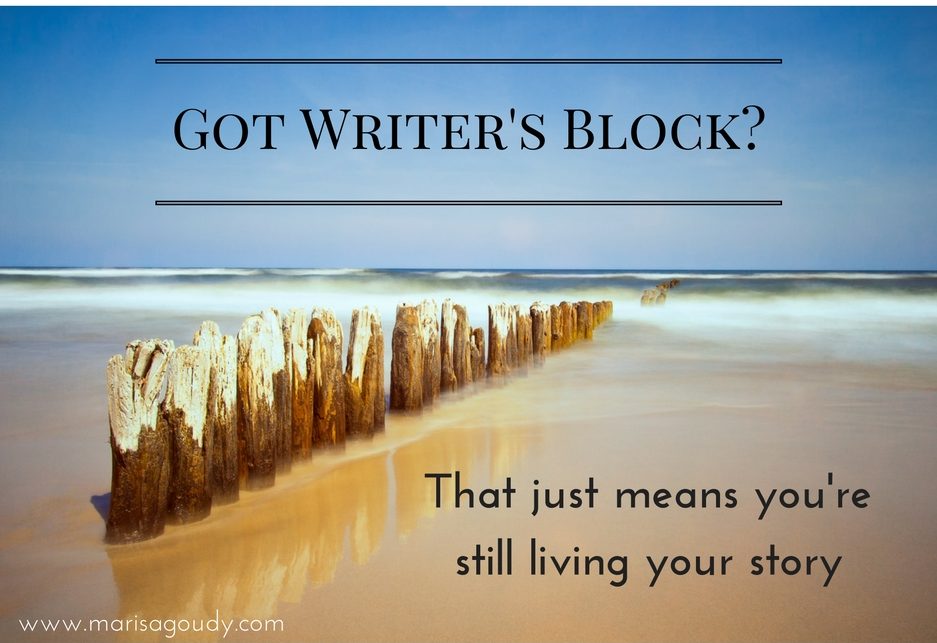 Someday, it might be fun to tell your grandkids that you had a front row seat for what will surely go down in history as one of the most infamous elections ever.
Since every person must tell the story from their own point of view, there will be hundreds of millions of versions of the 2016 presidential race, and they’ll only have one thing in common: each story will have a beginning, middle, and an end.
Someday, it might be fun to tell your grandkids that you had a front row seat for what will surely go down in history as one of the most infamous elections ever.
Since every person must tell the story from their own point of view, there will be hundreds of millions of versions of the 2016 presidential race, and they’ll only have one thing in common: each story will have a beginning, middle, and an end.
Eventually, you’ll have the perspective to understand when and how the story started (it probably wasn’t the day the winner announced his candidacy).
You’ll figure out the turning point (surprisingly, it wasn’t the day the Access Hollywood tape was released).
Already, some Americans can tell you the last line of the story: a 3 AM victory speech.
Others are still waiting to figure out how their story ends.
[tweetthis]If you have post-election writer's block it's because you're still living your story[/tweetthis]
How to be sure your 2016 election story isn’t finished yet
It's important to note that having an unfinished election story does not imply that you refuse to accept the results of the American democratic process or that you're into the whole #notmypresident thing. You could say it's more about the state of your heart than it is about making plans to move to Canada.
Here's a quick self-test to see if you're in the camp that's still waiting for an ending:
- If you have a love/hate relationship with the social media feeds and recognize that all these reactions are wrecking your health, but you still can’t look away, your story probably isn’t finished yet.
- If you’re someone who is trying to avoid all political material (except Joe Biden memes) and is focusing purely on videos of cats and puppies, then there's a decent chance your story isn’t finished yet. (And I’m really flattered you broke your own rules to read this!)
- And, if you’re someone who can’t turn journal entries or scattered notes into a complete article or blog post, your story definitely isn’t finished yet.
(Oh, and should you fit the unfinished story profile you probably appreciate pantsuits and the color blue, but that’s sort of a side issue at this point.)
Ultimately, you see the 2016 presidential race as something that’s about a lot more than the person who sits in the Oval Office. You understand that many of the the people you care about and work with can’t get back to life as usual in our post November 8th world.
You’re in touch with all of the feelings of shock, outrage, confusion, and emptiness that make you fantasize about taking to the streets or hiding under the bed. (And you probably vacillate between the two options in the space of a minute.)
But what about the persistent inner voice that says “you must write” (or podcast or try Facebook Live)?
A wise friend, a therapist and writer, who has been writing boldly into the most troublesome issues of the day kindly advised me to "give yourself a chance to wait until you regroup and heal."
My response? "Well, I guess I will be doing a lot of writing from the other side of the grave."
As a writing and storytelling coach for therapists, healers, and people in the transformation business, it’s my job to be two steps ahead. I’m here to support people who write to deepen self knowledge and publish content to support their practices. I show up online in order to model that process, but how on earth can I do that when I have no idea what I really think and I feel unqualified to offer guidance?
That sort of extra pressure only makes the writer’s block even more painful, of course.
But then, I remind myself that every honest person who has shared any insights over the last week owns the fact that they’re stumbling along unmarked paths with everyone else. Many have found a way to say… something. Few of these pieces feel complete or definitive, but that’s ok. Certainty is a lie when you don’t know the story’s real ending.
It’s enough to hold space like Dani Shapiro did, to own our disbelief and disorientation like Rob Bell did, or to apply timeless principles like Susan Piver did.
If it’s not a time for storytelling, it’s a time for story holding
What eases us through this time of confusion?
Stillness. Being aware of the mess. Feeling all the feelings. Kindness. Compassionate conversation.
We actually heal confusion by admitting that we’re mired in it and, as much as we hate to admit it, when we realize that confusion has a measure of power over us.
We collectively achieve clarity when we refuse to rush a story to a neat little ending before its time.
The good news? The wonderful news for therapists, healers, and transformation professionals? It’s your job to hold and keep safe the stories of others. Even if you’re a teacher and it often feels like you're called to perform and convey information, you’re also someone who witnesses and supports others’ growth.
The kind of work you do is about listening. It is the kind of work that asks you to respond to one person’s needs. It does not require you to fully articulate the new left wing agenda or how to reverse this new racism and misogyny sweeping America or how to decide if it's better to protest or pray.
Your work requires you to be articulate in long moments of silence and to hold space for clients going through their own dark nights, through their own stumbling confusion.
Your clients don't need to be guided to the end of their own election story. Your clients need you to help guide them back to themselves.
[tweetthis]In the #election aftermath, it might be better to be a story holder than a storyteller[/tweetthis]
And yet, it is always time for writing and self expression
Even as your work may call you to be fluent in the language of silence, please don’t silence yourself if the words are aching to come through.
I invite you to rely on your writing practice (as well as your meditation practice and other healing modalities that calm and unbind your soul) to find your way through your own confusion. And I invite you to heed the call to share those ideas when you trust the moment is right, when you trust that you must be heard.
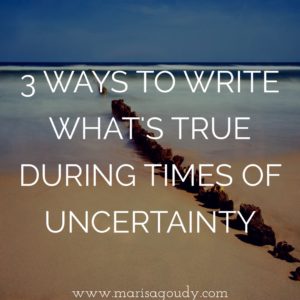 Here are 3 things I know as I write beside you through this time of uncertainty:
Here are 3 things I know as I write beside you through this time of uncertainty:
(And, yes, it's based on the Story Triangle that I use to help writers connect with their readers and their own truth. Click here to learn more. )
1. Self-focused first drafts are essential. Anne Lamott gave us permission to write “shitty first drafts.” By all means, feel free to write utter crap as long as it means you’re getting words on a page.
But please, please, please don’t allow yourself to write lousy versions of what someone else told you to think or what you assume the people want to hear from you. Write for yourself first in order to discover the truths within you.
2. Keep your audience in mind. What does your reader need from you? Why are you writing in this particular public forum? The territory you cover on a Medium post will likely be very different that the ideas you share on your business blog.
Know your platform and know its audience. When you get that SFD into the final draft, it needs to be re-crafted according to the needs of your reader. Do they need reassurance, do they need resources, do they need you to raise a ruckus, or do they need respite from all that election talk?
3. Remember that complete, compelling stories are everywhere, just waiting to be told. The great big election story is still being written as we see what a You Know Who presidency looks like, but there are countless little stories to be told along the way.
Even though many kids have taken the election results pretty hard (who else loves an elementary school kid who is still heart broken because we don't have a “girl president?), children are resilient. What stories are they living in the present moment?
Look for the ways that hope is being wrapped in a beginning, middle, and end. How are people uniting and taking positive action, despite the heavy November clouds?
Do you have stories that are begging to come through you? I can help hold space for you to tell them, support you as you clarify your ideas, and help you craft your words.
Set up a free 15 minute consultation to learn about how writing and story coaching can help you build your writing practice and your professional practice.
Filling the Storyteller's Chalice, #365StrongStories
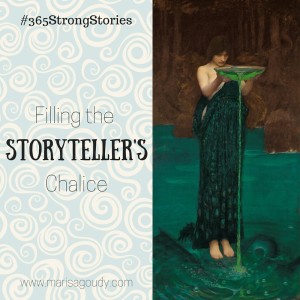 “You look like you’re in agony, dear one.”
“Oh, I’m not. I’m just… It’s the next story.”
“You look like you’re in agony, dear one.”
“Oh, I’m not. I’m just… It’s the next story.”
“I thought you were happy with this arrangement. The chance to take the stage in the square each day… It’s such an honor. And I’ve heard wonderful things.”
“Of course you have! You’re my husband,” she closed her eyes and pinched at the bridge of her long nose. “I do love doing it and I feel the good of it. I just don’t have anything left.”
“Nothing left! You told me that you were born a storyteller and I’ve never doubted that for a moment since we met.”
“Oh, but you know what it is to be tired when a deep place within your mind's worn through. Like all the creative fires has been put to bed in preparation for a night that just may not end.”
“I’m a glass blower, wife. When the fires go out I bid the apprentices to stoke them hotter than ever and I make thick tumblers for the publicans.”
“Ach, you’re no help! And I have to get up on the stage in less than two hours.”
“You are the Rememberer for these people. You hold their chalice and you wield their sword. Only you dare speak all of their dreams and their fears. You know the secrets what makes them proud and what makes them glad they weren’t born to some other savage race - no matter how rich their kings or fierce their warriors.
“Tell them of the goddess you love best,” he said, leaning forward to tuck the stray curls behind her ears. “Tell the women about how she stands tall in battle and how she births a dozen sons without dread. Tell the men about the swell of her breast and the warmth of her mystery. Tell the children that she holds the keys to the fairy realm. And, when you come home, tell me how you’re just like her.”
The storyteller sighed, but as she closed her eyes, it was not with weariness but trust. Trust in the man who held her chalice and called her to take up her own sword. Trust in the stories that guided her and everyone who gathered when she raised up her voice.
Sometimes this storyteller's chalice feels empty... If you'd like to contribute a story to the #365StrongStories project, read the submission guidelines here.






